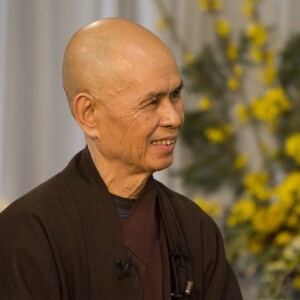
This talk by Thich Nhat Hanh is from the Lower Hamlet of Plum Village and is dated Sunday, December 22, 2013. It is the eleventh talk of the 2013-2014 Winter Retreat. In this talk we use the practice of walking meditation to explore themes of enlightenment, secularization of mindfulness, technology, schools, and the corporation. Both the audio recording and the video are available in this post.
02:22-12:18 Chanting
16:38-28:50 The practice of walking meditation
28:50-32:30 Enlightenment
32:30-40:01 Reflection on our Life in 2013
40:01-53:50 Coming Home to Ourselves and the Corporation
53:50-61:01 Secularization of Mindfulness and Being #1
1:01-1:06 Making Good Use of Technology
1:07-1:15 Intentions for Year 2014 - Walking Meditation
1:15-1:19 Mindfulness and a Sangha
1:19-1:32 UNESCO, Wake Up Schools, and Politics
Today during our Touching the Earth practice, we promised to the Buddha that we would enjoy the practice of walking meditation in our daily life. Every breath and step can generate a feeling of joy and a feeling of peace. Our body is a wonder. We don’t need to be in a hurry, looking for something. In Plum Village we practice walking mediation. Why do we practice walking meditation? The same question is asked of sitting meditation. How does Thay practice mindful movements? Why does Thay practice mindful movements? It is not only for better health. It tells Thay that he is alive and strong enough to do the movements. Thay shares about those astronauts who return to the earth and walk again - how long do they maintain this awareness? Mindfulness of being alive and walking on the earth is a wonderful thing. To enjoy walking meditation is not difficult.
Everyone can have mindfulness of breathing. Enlightenment can arise in a few seconds with awareness of our breath and that we are alive and we have a body. Buddhism is not exactly a religion but it is a way of living. You don’t need to be a Buddhist to practice mindfulness. We can even generate this while we brush our teeth.
Many of us have searched for material comforts and many of us do have many material comforts but we may still not be happy. Time is something we should treasure. When we wake up in the morning, we can breathe and be aware that we have 24-hours to live. Thay teaches the waking up gatha. With the end of the year, it may help us to think about the way we live our life. How did we spend 2013? What have we done with our life? Can we live with more joy?
This year we had the opportunity to visit Google and spend a whole day practicing with the employees. We noticed the people there practiced whole-heartedly - they did walking, sitting, and eating mediation. A company like that wants to succeed and be #1 but there is also so much suffering. They do not have the time to take care of their body, feelings, emotions, families, etc. They see a need for a spiritual practice so they can suffer less. Time is no longer money. Time is peace. Time is life. Thay shares further about the visit to Google and how we can suffer less through our practice. Going home to ourselves. We are running away from ourselves and we do not take the time to take care of ourselves. If we cannot take care of ourselves, how can we take care of the person we love? Is technology helping us run away from ourselves? Thay sees a struggle within corporate culture - they have stress, guilt, etc. They want to learn ways to deal with these issues.
Is it possible to be #1 and be happy? This is the dilemma. There are people who are victims of their success, but there is nobody is a victim of their happiness. Which is #1 priority? The bottom line in the corporation is still thinking of being #1 in their area. And some practice mindfulness to become #1 and not to become happy. Are they using mindfulness to do the things to be more successful in business? Can you use mindfulness to make money? It is the same question/issue of those who teach mindfulness but don’t practice mind...
view more
More Episodes
Fresh Opportunities of Abundance
 2015-03-01
2015-03-01
 2015-03-01
2015-03-01
Evolutive Dharma
 2015-01-30
2015-01-30
 2015-01-30
2015-01-30
Francophone Educators’ Retreat
 2014-11-15
2014-11-15
 2014-11-15
2014-11-15
An Update from the Editor
 2014-10-29
2014-10-29
 2
2
 2014-10-29
2014-10-29
 2
2
The Practice of True Presence
 2014-09-30
2014-09-30
 14
14
 2014-09-30
2014-09-30
 14
14
This is a Legendary Moment
 2014-09-24
2014-09-24
 1
1
 2014-09-24
2014-09-24
 1
1
Our Cosmic Body
 2014-09-22
2014-09-22
 1
1
 2014-09-22
2014-09-22
 1
1
Right Livelihood and True Love
 2014-09-09
2014-09-09
 2014-09-09
2014-09-09
Professor Buddha and the Bell
 2014-09-05
2014-09-05
 2014-09-05
2014-09-05
The Popularity of Mindfulness
 2014-08-30
2014-08-30
 1
1
 2014-08-30
2014-08-30
 1
1
The French Call It Amour
 2014-08-29
2014-08-29
 1
1
 2014-08-29
2014-08-29
 1
1
A Cloud in the Water
 2014-08-21
2014-08-21
 2014-08-21
2014-08-21
What is Truth?
 2014-08-21
2014-08-21
 2014-08-21
2014-08-21
The Sky is Giving a Dharma Talk
 2014-08-20
2014-08-20
 2014-08-20
2014-08-20
Seeing with Buddha Eyes
 2014-08-17
2014-08-17
 3
3
 2014-08-17
2014-08-17
 3
3
Solidity and Freedom – German Retreat
 2014-08-16
2014-08-16
 2014-08-16
2014-08-16
Who Am I?
 2014-08-13
2014-08-13
 3
3
 2014-08-13
2014-08-13
 3
3
The Mark of Suffering
 2014-08-08
2014-08-08
 1
1
 2014-08-08
2014-08-08
 1
1
Why Am I Myself?
 2014-07-31
2014-07-31
 2014-07-31
2014-07-31
What is Man?
 2014-07-27
2014-07-27
 2014-07-27
2014-07-27
012345678910111213141516171819
Create your
podcast in
minutes
- Full-featured podcast site
- Unlimited storage and bandwidth
- Comprehensive podcast stats
- Distribute to Apple Podcasts, Spotify, and more
- Make money with your podcast
It is Free
- Privacy Policy
- Cookie Policy
- Terms of Use
- Consent Preferences
- Copyright © 2015-2024 Podbean.com



